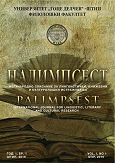REALIZATIONS OF EMOTIVE LANGUAGE IN FACEBOOK COMMENTS
DOI:
https://doi.org/10.46763/PALIM24917079sAbstract
This study examines the verbalization of emotions in online media. We express emotions not only to show our subjective awareness but also to evaluate the world we live in. Emotions are universal experiences that are common to all people. They are difficult to control, are often the cause of irrational human behavior, and cause people to behave in certain ways (cf. Fiehler, 1990, p. 41; Ortner, 2014, p. 6 ff). Emotions, as constitutive phenomena of our lives, are given a certain representation in linguistic expressions and are thus conveyed and made visible to others. They are also perceived as very intense and personal experiences that come from the inside and can be expressed through language and actions. Language therefore enables us to communicate our emotions verbally. The 21st century is known as the digital age. In the age of information technology, the language of communication has also been reorganized. Digitalization has developed rapidly in recent years, and the exchange of information has become very intensive. We would like to take a closer look at emotional vocabulary in social networks. In this study, texts from social media (such as Facebook) are analyzed regarding the verbalization of emotions at the level of the word, sentence, and text.
Keywords: emotions; emotion linguistics; emotion markers; Facebook comments.
Downloads
Downloads
Published
Issue
Section
License
The intellectual property and copyright on the original content of all scientific contributions in the published paper shall remain with the authors. Authors give permission to the PALIMPSEST owner to publish the paper. All authors agree to publish the paper under Attribution-NonCommercial-NoDerivatives 4.0 International license (CC BY-NC-ND 4.0)


